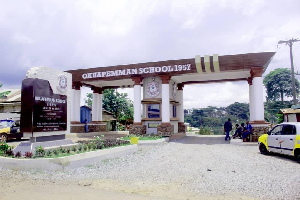Opinions of Wednesday, 19 August 2020
Columnist: Charles Manu
Ethics and Social Responsibility
Knowledge is power. Information is liberating. Education is the premise of progress for every society, for every family. - Kofi Annan.
The recent spate of spontaneous acts of hooliganism, thuggery, vandalism to state property procured with our scarce resources perpetrated by a number of recalcitrant Senior High School (SHS) students (males and females) at some identified schools in the country is very unfortunate. Of particular significance was the unsightly scene of some male students hauling unprintable abusive words on the President of the Republic on television.
This is very sad indeed and far below the belt. This sort of unethical behavior emanating from our “future leaders” is despicable, abhorring and unacceptable. What they have done is contrary to the obvious and universal norms of human conduct and should be condemned unreservedly by all right-thinking people.
It is un-Ghanaian and something proactive needs to be done to mitigate and to prevent future recurrence and to salvage our dented hard-won reputation locally and internationally.
The genesis of the whole episode is known to almost every Ghanaian and with time constraints there is no need to go over it in depth. In a nutshell, they were supposed to sit for their final year West African Secondary School Examination (WASSCE). Prior to that the government had purchased some past papers for them to study and to familiarize themselves with the pattern or format of the examination papers. Apparently, they did not adequately prepare themselves for the examinations and therefore performed poorly. They then turned round to accuse the government, specifically the President, they were not favoured in the ongoing WASSCE.
It must be emphasized that these students are our (Ghanaian) future leaders, as indicated above, and all (parents, teachers and instructors) must endeavor to assist them by way of training and mentoring at home complemented at school right from the primary, through secondary to tertiary institutions to forestall the above canker in the country.
There is nothing one can do to erase the wrongs and the mistakes of the past, but there is everything one can do better so that one does not repeat the same wrongs and mistakes in the future.
The training, mentoring and related guiding principles cited above need to be carried out in a systemic approach with emphasis on “ethics”.
Ethics is defined as the code of moral principles that sets standards of good or bad, or right or wrong, in one’s conduct (A. Nelson et al, Managing Business Ethics, New York: Wiley, 2003). Ethics provides principles to guide behavior and help people to make moral choices among alternative courses of action. In practice, ethical behavior is that which is accepted as “good” and “right” as opposed to “bad” and “wrong” in the context of the governing moral code.
There is no doubt that “individual character” is the foundation of all that we do. It establishes our integrity and provides an ethical anchor for how we behave at school, at work and in life overall. Persons of high character can always be confident in the self-respect it provides, even in the most difficult of situations. Those who lack it are destined to perpetual insecurity, acting inconsistently, and suffering not only in self-esteem but also in the esteem of others.
How strong is your individual character? How well do your values prepare you to deal with the inevitable ethical dilemmas and challenges that pop up at school, in work and in life. How does your behavior as a student stack up on ethics issues? Do you engage in plagiarism, copied homework or cheating on exams? Do you tolerate others who do these things? What does this say about your integrity and how you are likely to behave at work – handling expense accounts, using company cars and mobile phones, calling in sick, tolerating anti-social behavior, or reporting work performance?
In this regard we may be guided by the Six Pillars of Character identified by the Josephson Institute of Ethics as shown below:
. Respect – civility, courtesy and decency, dignity, tolerance and acceptance.
. Responsibility - sense of accountability, pursuit of excellence, self-reliant.
. Trustworthiness – honesty, integrity, reliability in keeping promise, loyalty.
. Fairness – commitment to process, impartiality, equity.
. Caring – concern for others, benevolence, altruism.
. Citizenship - knowing the law, being informed, volunteering.
Perhaps it may be encouraging for the youth to take a moment to go through the above principles and see if they can give specific examples showing how their behavior lives up to them.
In summary, the youth should realize that in life the right foundation is vital. The right foundation can make a difference between something that lasts or temporary. Some people take the easy way, others try to find short cuts, others cheat, whereas others do things in halves to achieve their goals and objectives. But in building our lives the right foundation is hard work, nothing but hard work characterized by self-governance ingredients, namely, honesty, integrity, ethics, commitment and leadership. And the gospel truth is that it is the only bedrock worth building on.
Character and its underlying foundation of personal integrity is not something that should be of occasional concern. It deserves more than a passing or even reluctant attention. After all it is the character of people who make key decisions to determine if our national, regional, district and local institutions and organisations act responsibly or irresponsibly.
Ghana, our beloved country, needs well-trained, disciplined, morally upright, exemplary hard-working leaders and practitioners whose action and behaviour would make Ghana stand out in the comity of nations.
Author:
Charles Manu, Former Assistant Director, Professional Development, Australian Public Service.













